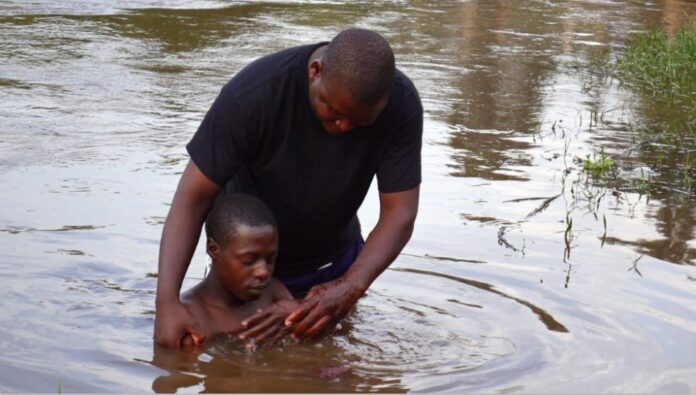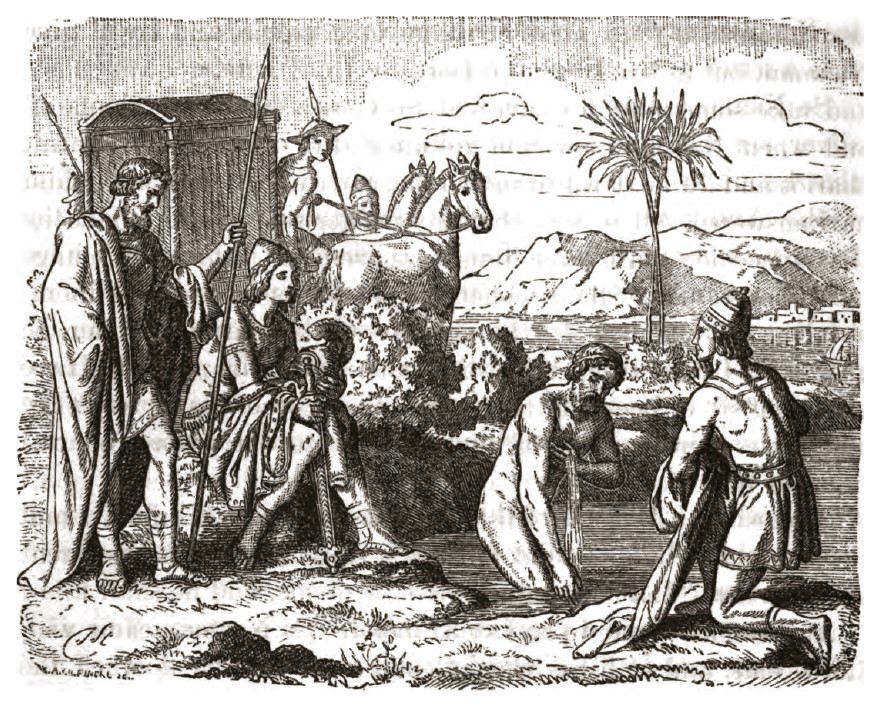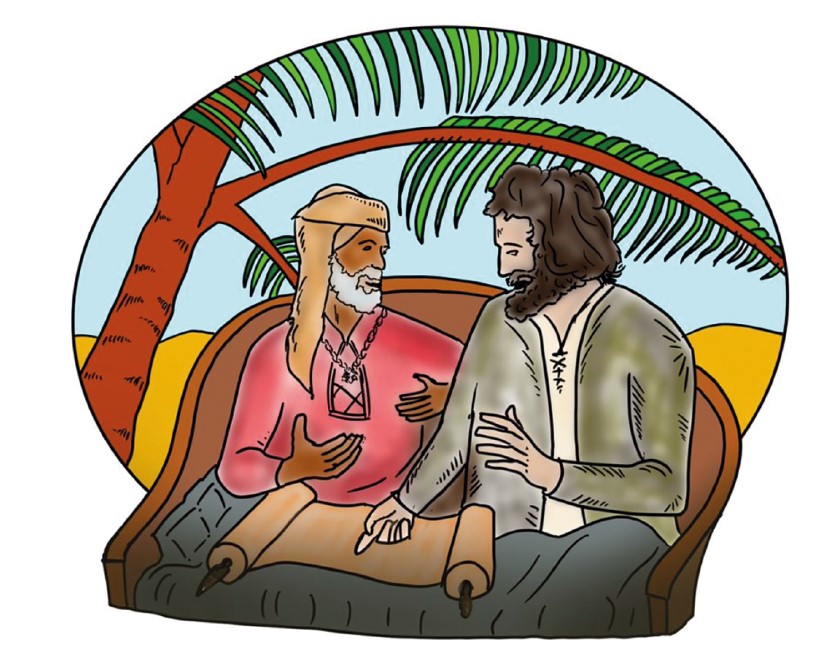Once upon a time there was a king who felt unwell, so he summoned a minstrel to sing for him. The king mentioned a few of his favourite songs. “Oh Your Majesty,” replied the minstrel, “those songs are rather old fashioned; I’ll sing some better ones that I’m sure you’ll enjoy.” So he sang. At the end of the evening the minstrel asked for his fee. “No,” said the king, “there is no fee. You performed according to your wishes, not mine.”
That little story presents an important principle. If we wish to receive God’s blessings, we must do as God teaches and not as we want to do.
An Old Testament Illustration
Naaman the Syrian was an eminent man, but he had a big problem—he had leprosy, a disease that was incurable and fatal. His story is in 2 Kings chapter 5. He heard that there was a prophet in Israel who could heal him and so he travelled to Israel accompanied by a retinue of servants and taking many gifts for the prophet. But Elisha the prophet did not even greet Naaman personally; instead he sent a servant to tell Naaman to go to the river Jordan and wash in the river seven times. Naaman was outraged! He turned his chariot and entourage around to return to Syria. But some of his servants urged him to swallow his pride. To his credit, Naaman listened; he showed a humble spirit, and with all those servants watching, he went into the water—seven times. On coming up out of the water after the seventh time he found that the dread disease had gone. He had been healed! But notice the point —first of all he had to put pride to one side and show a humble and obedient spirit. Otherwise he would have remained a leper.
New Testament Examples
Saul (later known as Paul) initially was a zealot who persecuted Christians, throwing both men and women into prison and hounding others to their deaths. He presided over the stoning to death of the Christian Stephen (Acts 22:4, 19–20). But later he himself was converted and he understood what terrible things he had done. What could he do? The past cannot be undone and that burden of guilt lay heavily on Saul. But Ananias came to Paul and told him what to do: ‘Why do you wait? Rise and be baptized and wash away your sins, calling on his name’ (v. 16). Notice the words ‘wash away’, as if that burden of guilt was something unclean, like the leprosy of Naaman, that could be washed away.
After his resurrection, Jesus commanded his disciples, ‘Go into all the world and proclaim the gospel to the whole creation. Whoever believes and is baptized will be saved, but whoever does not believe will be condemned’ (Mark 16:15–16). Of course, anyone who did not believe would not want to be baptised, but those who did believe must show their faith by being baptised.
The apostle Philip preached the Gospel in the region of Samaria. On seeing the miracles of healing that Philip did, people also listened to his preaching: ‘When they believed Philip as he preached good news about the kingdom of God and the name of Jesus Christ, they were baptized, both men and women’ (Acts 8:12).
Later in the same chapter, Philip was told to go to the road between Jerusalem and Gaza. There he met an Ethiopian man returning home from Jerusalem. As he rode along in his chariot he was reading from the prophecy of Isaiah, chapter 53. ‘Do you understand what you are reading?’ Philip asked. The Ethiopian replied, ‘How can I, unless someone guides me?’ And he invited Philip to come up and sit with him (Acts 8:30–31). So Philip joined him in his chariot and explained that marvellous chapter to him, showing that the coming of Jesus had been foretold hundreds of years before. Here are a few words from that chapter:
He was despised and rejected by men; a man of sorrows, and acquainted with grief; and as one from whom men hide their faces he was despised, and we esteemed him not. Surely he has borne our griefs and carried our sorrows; yet we esteemed him stricken, smitten by God, and afflicted. But he was wounded for our transgressions; he was crushed for our iniquities; upon him was the chastisement that brought us peace, and with his stripes we are healed (Isaiah 53: 3–5).
No doubt there were many other passages that Philip explained too; he may have discussed Psalm 22, which was written 1000 years before the time of Jesus and long before crucifixion had been thought of but which presents the sufferings of the Lord in detail; he may have discussed the sacrifice of Isaac as a ‘picture’ of the sacrifice of Jesus (Genesis 22). Eventually they came to an oasis. Clearly Philip had discussed baptism with the man because on seeing the water he said, ‘See, here is water! What prevents me from being baptized?’ (Acts 8:36). And he was. They went down both into the water and Philip baptised him, then they came up out of the water (vs. 38–39). It was not a matter of sprinkling water on the man. There would have been plenty of water to hand in the Ethiopian’s retinue. His baptism involved finding a pool, and being dipped under its surface.
How It Works
But why must believers be baptised? Well, first of all, we have no right to go to the Almighty demanding an explanation. Nevertheless, God does tell us the meaning of baptism:
Do you not know that all of us who have been baptized into Christ Jesus were baptized into his death? We were buried therefore with him by baptism into death, in order that, just as Christ was raised from the dead by the glory of the Father, we too might walk in newness of life. For if we have been united with him in a death like his, we shall certainly be united with him in a resurrection like his (Romans 6:3–5).
Baptism, therefore, is a ‘picture’ of the death, burial and resurrection of Jesus. By that act of obedience and faith we can show to God that we believe that Jesus defeated human nature (the devil) in his own life; that he presented an unblemished life to his Father; that God raised him from the dead to immortality; and that if we accept Jesus as our Saviour, we can stand before God, not in our own merit but in the all-sufficient merit of Jesus. Jesus is ‘the way’; we can either gratefully accept God’s offer or we can ignore it. The choice is ours.
One day Jesus received a visitor, Nicodemus, and explained to him what we must do to be saved: ‘Truly, truly, I say to you, unless one is born of water and the Spirit, he cannot enter the kingdom of God. That which is born of the flesh is flesh, and that which is born of the Spirit is spirit’ (John 3:5–6).
There are, therefore, three births for those who will follow the Lord Jesus Christ: first, our natural birth. Second, our birth of water—through baptism. Third, birth of the spirit. Baptism is a turning point in our lives; we remember the event and the date. Being born of the spirit is a daily, life-long effort. Each day we must try to follow the example of Jesus so that our lives reflect his life. If we have been born again, then finally there will be another change, by God’s grace when Jesus returns: ‘Beloved, we are God’s children now, and what we will be has not yet appeared; but we know that when he appears we shall be like him’ (1 John 3:2).
David Budden




